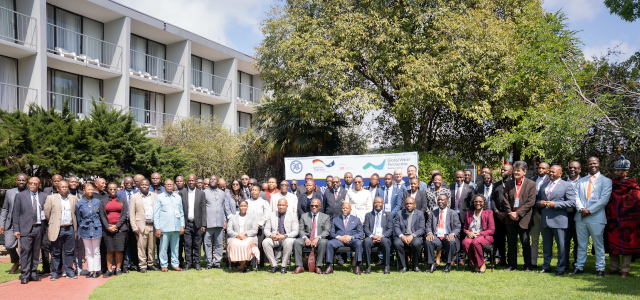The Dialogue was organised by the Southern African Development Community (SADC), in collaboration with the Ministry of Natural Resources of the Kingdom of Lesotho and with the support of the German Government through the SADC GIZ Transboundary Water Management (TWM) project and the Global Water Partnership Southern Africa (GWPSA).
The event was held under the theme: “Water Security, Innovation, and Nexus Action: Watering and Enabling Regional Economic Development Corridors for Transformation in SADC.”
Over the course of the two days, policymakers, practitioners, and partners explored how water security, innovation, and Nexus action can unlock climate-resilient and inclusive regional economic corridor development in Southern Africa.
Key highlights included:
- Exploring innovative, risk-informed water infrastructure solutions for trade and regional value chains.
- Clarifying water’s role in driving smart, integrated, climate-resilient regional economic corridors.
- Promoting collaboration across RBOs, TFCAs, private sector and CSOs to strengthen partnerships.
- Aligning the SADC approach with Agenda 2063 and the AfCFTA vision for inclusive and sustainable growth.
Honourable Mohlomi Moleko, Minister of Natural Resources of the Kingdom of Lesotho, officially opened the Dialogue.
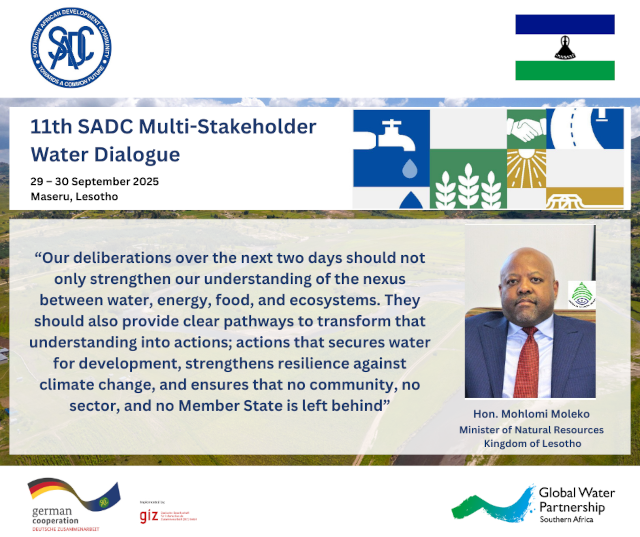
As the region seeks to deepen economic integration and industrial transformation, the SADC Secretariat has initiated processes to promote a regional economic corridor development approach.
This approach aligns with the continental vision under the African Union’s Agenda 2063 of an integrated corridor approach for the development of “inclusive, sustainable and world-class Infrastructure” for inclusive and sustainable growth and development, especially as the continent pushes forward with the Africa Continental Free Trade Areas (AfCFTAs) initiative.
The SADC regional economic corridor development approach aims to stimulate regional value chains, attracting investment, and improving connectivity through infrastructure and services in energy, water, Information and Communication Technology (ICT), agriculture, and trade, hence the focus for the 11th SADC Multi-Stakeholder Water Dialogue.
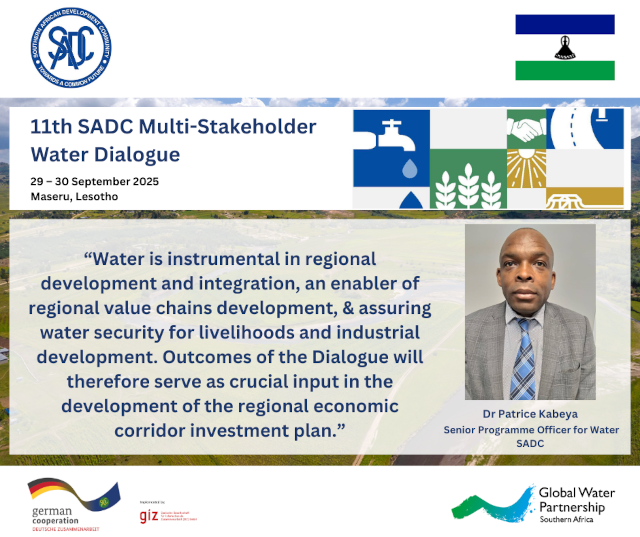
The German Government supported the Dialogue through the SADC Transboundary Water Management (TWM) project, implemented by the Deutsche Gesellschaft für Internationale Zusammenarbeit (GIZ) GmbH.
The TWM project helps SADC strengthen cooperation on shared water resources, advance key policies, and promote dialogue among Member States and partners.
The TWM project's impact so far include:
- Supporting the SADC Water Division to develop a strong policy framework including the Development of the five Regional Strategic Action Plan (RSAPs) for Integrated Water Resources Development and Management between 2005 and 2025.
- Supporting the establishment of six RBOs and continuous strengthening of their governance and IWRM Planning e.g. through the development of six IWRM Plans
- 16 degraded headwaters in Lesotho restored, improving water security for up to 1 million people across the Orange–Senqu basin (Lesotho, South Africa, Botswana, Namibia).
For Germany, this is about more than water: it means climate resilience, economic stability, and stronger EU–Africa partnerships. Together, Germany and SADC are ensuring that shared rivers become lifelines of resilience, integration, and sustainable growth.
The Global Water Partnership Southern Africa has supported the organisation of the SADC Multi-stakeholder for several years now.
Speaking on this year’s theme, GWPSA Interim Executive Secretary, Mr Andrew Takawira said the region's development corridors: the North–South, Maputo, Beira, Nacala, Walvis Bay, Lobito, and others, are the arteries of regional integration.
"They connect countries and markets, they move goods and people, and they stimulate investment. But if they are to deliver their full potential, they must also become lifelines of resilience, food security, and climate-smart growth. And water is the entry point."
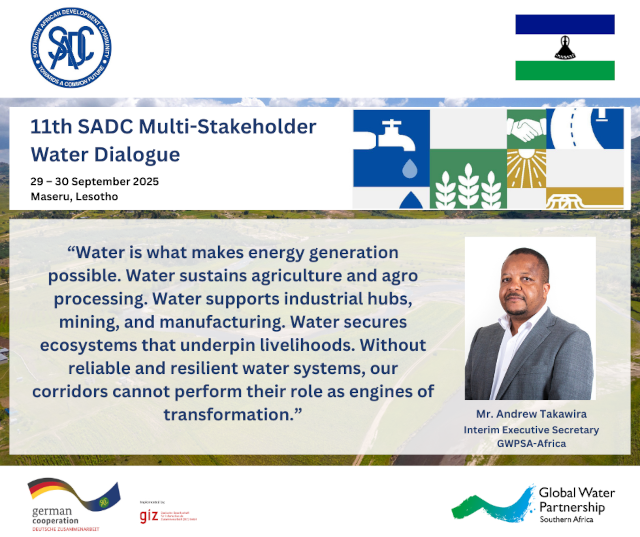
During the Dialogue, delegates also discussed innovative climate-resilient and risk-informed water infrastructure solutions towards trade and regional value chains, and financing nexus investments in corridors.
The Dialogue also focused on partnerships for inclusive and sustainable regional economic corridor growth, delving into collaborations between RBOs, TFCAs, the private sector and CSOs.
In her remarks, Ms. Relebohile Lebeta, Principal Secretary in the Ministry of Natural Resources of the Kingdom of Lesotho, commended the SADC Secretariat for organizing the Dialogues over the years, demonstrating how water is at the heart of regional development.
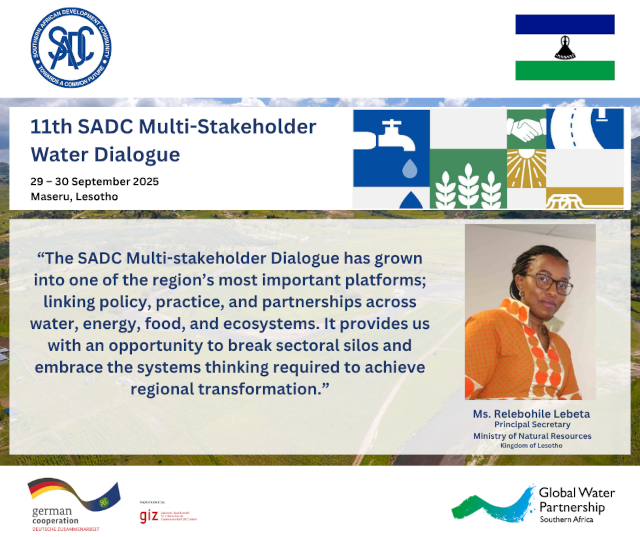
"Lasting water security in Southern Africa can only be achieved through action and coordination at all levels – national governments, river basin organisations, and regional institutions," said Ms Anna Renieri, Head of Cooperation, EU Delegation in Lesotho.
The EU actively supports this multi-level architecture as follows:
- River Basin Level: Strengthening RBOs such as OKACOM (Decision Support System and CORB Fund) and ORASECOM (IWRM planning, investment, and the “Source to Mouth” campaign).
- Regional Level: Strategic cooperation with SADC on Nexus Regional Dialogues, advancing integrated planning across water, energy, and food security.
Ms. Anna Renieri said the EU Global gateways can offer support to sustainable, inclusive, and climate-resilient investments that create opportunities for people while safeguarding ecosystems.
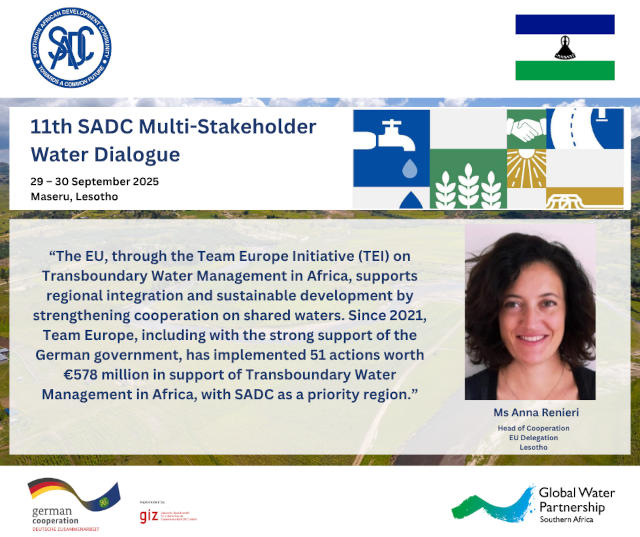
At the end of the two days, the Dialogue called for strengthened collaboration and innovative approaches to advance integrated water, energy, food, and ecosystem (WEFE) solutions in support of corridor development across the region.
Participants made the following key recommendations:
- Integrate water planning and management with a deeper data-driven understanding and continuous monitoring to inform evidence-based decision-making.
- Maximise and integrate floodwater harvesting through the use of underground storage, managed aquifer recharge, and other innovative water storage options to enhance resilience.
- Adopt system life cycle planning and design for dam and water infrastructure development, ensuring that green infrastructure measures are incorporated into operations and maintenance (O&M) investment costs.
- Develop sustainability plans to address water pollution, sediment control, and ecosystem degradation.
- Formulate clear de-risking strategies and implement robust social and environmental safeguards to attract and sustain investment in water-related infrastructure.
- Address research and capacity gaps relevant to transboundary and corridor development by strengthening collaboration with academic and research institutions.
- Apply systems thinking and complexity analysis in the design of WEFE solutions that support integrated and adaptive corridor development.
- Establish corridor compacts in partnership with River Basin Organisations (RBOs) and Transfrontier Conservation Areas (TFCAs), and promote the formulation of integrated corridor agreements at both regional and continental levels to ensure coherence and sustainability.
- Promote multisectoral investment approaches, recognising that infrastructure developed in isolation within a single sector is often less attractive and less sustainable than integrated, cross-sectoral initiatives.
- Adopt best practices in communication and knowledge sharing to strengthen collaboration, improve stakeholder engagement, and enhance the visibility of water–energy–food–ecosystem (WEFE) initiatives.
- Enhance data governance by developing and adopting standardised protocols that enable harmonised systems, facilitate interoperability, and support efficient information and data exchange across institutions and countries.
- Address water trade-offs by balancing the needs for wetland conservation with water use for development, ensuring that ecosystem services are preserved while supporting socio-economic growth.
- Break down sectoral silos in planning and implementation to promote coordinated and integrated development approaches across the WEFE sectors.
- Invest beyond corridor boundaries, acknowledging that ecosystems extend beyond defined geographical or administrative areas, and require management that reflects their natural connectivity.
- Foster coordinated action in sectors where water is an enabler, ensuring that water catalyses inclusive and sustainable development across the region
The SADC Multi-Stakeholder Dialogue is a biennial event convened by the SADC Secretariat to provide a platform for dialogue between water practitioners, policymakers, and other influencing sectors to address issues critical to regional integration, industrialisation, and poverty eradication in the SADC region. Click here to view photos from the Dialogue Day 1 and Day 2.
